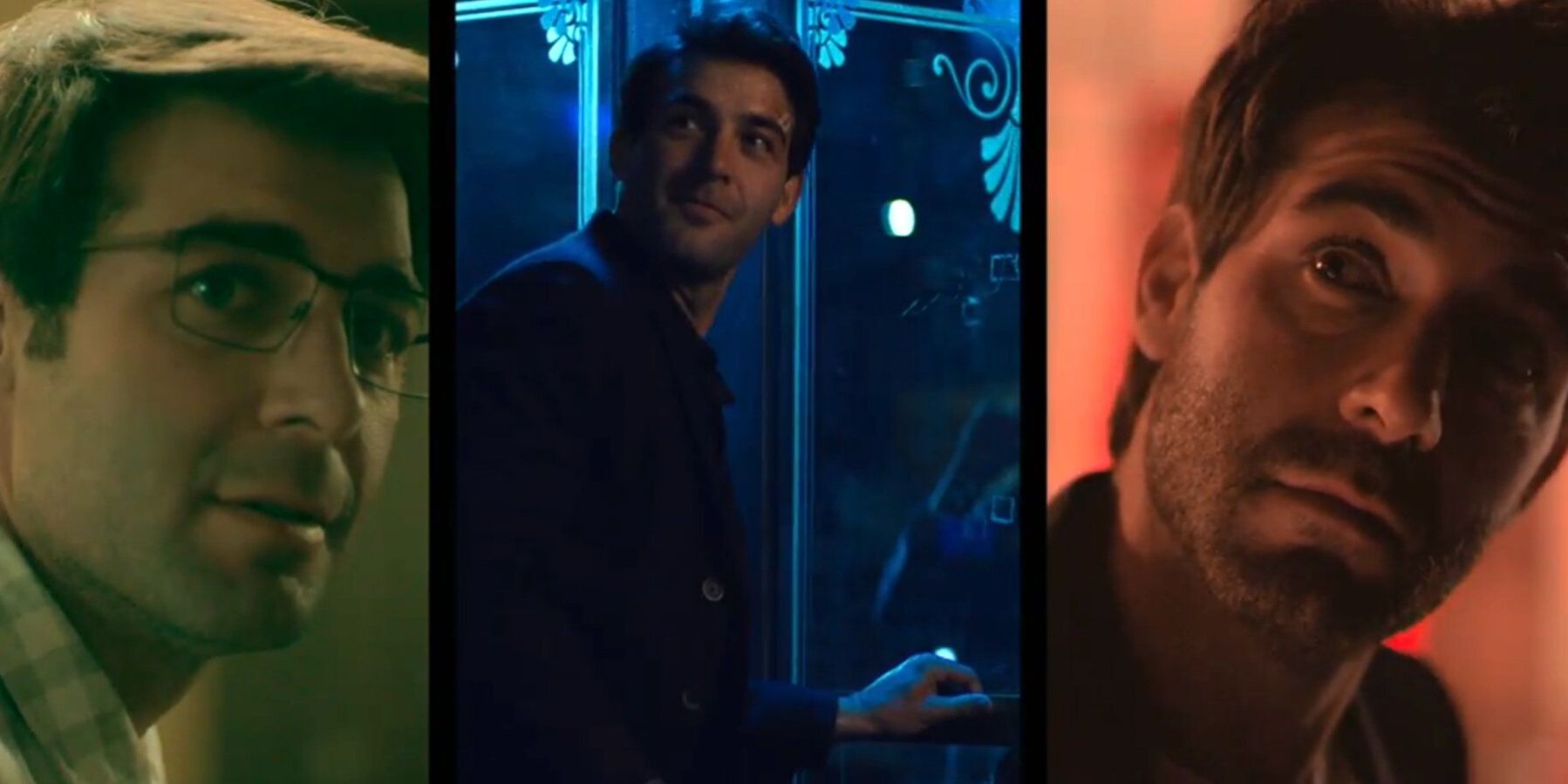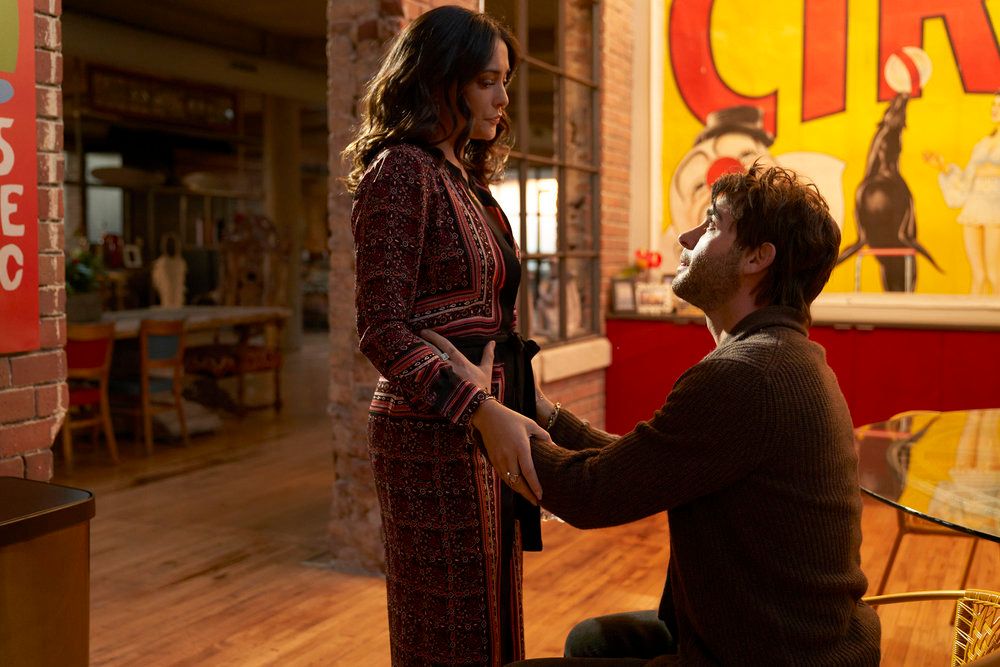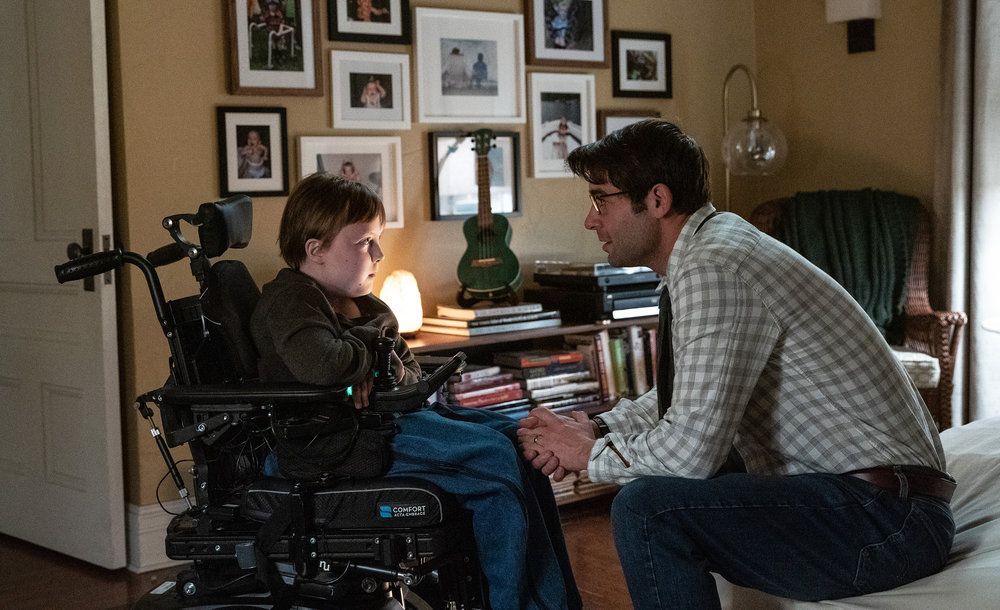Why give the audience one weepy drama when you can give them three? That seems to be the philosophy behind NBC drama Ordinary Joe, in which the title character experiences heart-wrenching situations in three alternate universes. However, once the show introduces the diverging timelines in its first episode, the multiverse set-up doesn't really play into the narrative. Ordinary Joe proceeds on three separate, non-overlapping tracks. These Joes aren't aware of each other. They're just three versions of the same guy muddling through life.
It helps that the charming James Wolk stars as Joe, convincingly playing three different versions of the character. Ordinary Joe opens in 2011, as Joe is about to graduate from Syracuse University. After his graduation ceremony, he's presented with three literal diverging paths. One path leads to Jenny (Elizabeth Lail), Joe's best friend and occasional girlfriend, who wants him to join her on a beach trip. Another leads to Amy (Natalie Martinez), a fellow graduate Joe ran into right before the ceremony and with whom he felt a connection. The last path leads to Joe's family, who want to take him out for dinner after graduation. These seemingly simple choices place Joe on three very different life trajectories.
Showrunners Garrett Lerner and Russel Friend (working from a concept created by Matt Reeves) aren't subtle about the significance of Joe's decision at this moment. At the graduation ceremony, Jenny gives a speech quoting from Robert Frost's poem "The Road Not Taken," and as Joe is debating which path to take, his buddy Eric (Charlie Barnett) teases him that he hasn't made a decision on his own since he was 13. The show's habit of bluntly overstating its themes and emotional beats starts here, although, at least, Wolk's ubiquitous narration soon subsides.
Following Joe's momentous decision that he doesn't realize will be so momentous, Ordinary Joe cuts to 10 years later as three different Joes are living the consequences of that decision. In a basic but reliably helpful move, the show color-codes each of its three timelines, so that even though they all feature the same characters in many of the same locations, it's always easy to tell them apart. The Joe who went to the beach with Jenny is in a green-tinted timeline, where he's married to Jenny, raising a son named Chris (John Gluck), and working as a nurse. The Joe who talked to Amy is in a red-tinted timeline, where he's married to Amy and living his dream as a rock star. And the Joe who went to dinner with his family is in a blue-tinted timeline, where he's single and living with his mom Gwen (Anne Ramsay), and following in his late father's footsteps by working as a police officer alongside his uncle Frank (David Warshofsky).
The Joes all live in New York City, and all of them have the same people in their lives, to varying degrees, including Jenny, Amy, and Eric. Lerner and Friend have a tough time creating a balance between making the timelines distinctive and making sure that they aren't so radically different that the characters seem like entirely different people. The result is a sort of mushy middle ground. Joe's three professions are miles apart, but Jenny is some form of a lawyer in all three timelines, and two Amys work for Congressman Bobby Diaz (Adam Rodriguez), whose campaign provides the show's mild suspense-thriller elements.
In the two episodes available for review, the suspense is minimal, mostly connected to a would-be assailant with a mysterious grudge against Diaz. The cliffhangers in Ordinary Joe are more emotional, often hinged on one Joe learning something that the others don't (yet) know. Although Ordinary Joe doesn't tug too hard on heartstrings, there are times when it feels like watching three This Is Us' at once. Joe-the-rock-star and Amy struggle to conceive a child. Joe-the-nurse and Jenny consider divorce. Joe-the-cop deals with family pressure to get married. All of them could probably use a good therapist.
All three Joes are still grieving Joe's police-officer father, who died on 9/11 and whose sacrifice is played for cheap sentiment in the second episode. Those mawkish beats are amplified when three versions of the same Joe are going through the same emotions in only slightly different ways. The portrayal of Joe and Jenny's son, who was born with a condition called spinal muscular atrophy and uses a wheelchair, isn't quite as manipulative, but it's still deployed as another potential source of gotcha moments to jolt viewers.
It's hard to tell with just two episodes how well the balance of the three timelines and characters will work in the long term. As Joe-the-cop solves a mystery, Joe-the-nurse's marital problems may seem less interesting in comparison. Already, Joe-the-rock star seems distant from any realistic sense of fame, awkward references to TikTok aside. Ordinary Joe simultaneously takes on too much and too little, spreading itself thin among three mediocre takes on the same character. It's three shows crammed together with barely enough material to support one.
Ordinary Joe airs Mondays at 10 p.m. ET/PT, starting Sept. 20 on NBC.



